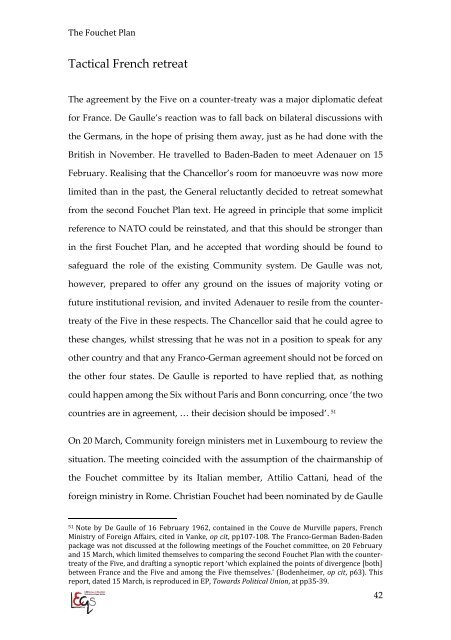The Fouchet Plan De Gaulle’s Intergovernmental Design for Europe
n?u=RePEc:eiq:eileqs:117&r=cdm
n?u=RePEc:eiq:eileqs:117&r=cdm
You also want an ePaper? Increase the reach of your titles
YUMPU automatically turns print PDFs into web optimized ePapers that Google loves.
<strong>The</strong> <strong>Fouchet</strong> <strong>Plan</strong><br />
Tactical French retreat<br />
<strong>The</strong> agreement by the Five on a counter-treaty was a major diplomatic defeat<br />
<strong>for</strong> France. <strong>De</strong> <strong>Gaulle’s</strong> reaction was to fall back on bilateral discussions with<br />
the Germans, in the hope of prising them away, just as he had done with the<br />
British in November. He travelled to Baden-Baden to meet Adenauer on 15<br />
February. Realising that the Chancellor’s room <strong>for</strong> manoeuvre was now more<br />
limited than in the past, the General reluctantly decided to retreat somewhat<br />
from the second <strong>Fouchet</strong> <strong>Plan</strong> text. He agreed in principle that some implicit<br />
reference to NATO could be reinstated, and that this should be stronger than<br />
in the first <strong>Fouchet</strong> <strong>Plan</strong>, and he accepted that wording should be found to<br />
safeguard the role of the existing Community system. <strong>De</strong> Gaulle was not,<br />
however, prepared to offer any ground on the issues of majority voting or<br />
future institutional revision, and invited Adenauer to resile from the countertreaty<br />
of the Five in these respects. <strong>The</strong> Chancellor said that he could agree to<br />
these changes, whilst stressing that he was not in a position to speak <strong>for</strong> any<br />
other country and that any Franco-German agreement should not be <strong>for</strong>ced on<br />
the other four states. <strong>De</strong> Gaulle is reported to have replied that, as nothing<br />
could happen among the Six without Paris and Bonn concurring, once ‘the two<br />
countries are in agreement, … their decision should be imposed’. 51<br />
On 20 March, Community <strong>for</strong>eign ministers met in Luxembourg to review the<br />
situation. <strong>The</strong> meeting coincided with the assumption of the chairmanship of<br />
the <strong>Fouchet</strong> committee by its Italian member, Attilio Cattani, head of the<br />
<strong>for</strong>eign ministry in Rome. Christian <strong>Fouchet</strong> had been nominated by de Gaulle<br />
51 Note by <strong>De</strong> Gaulle of 16 February 1962, contained in the Couve de Murville papers, French<br />
Ministry of Foreign Affairs, cited in Vanke, op cit, pp107-108. <strong>The</strong> Franco-German Baden-Baden<br />
package was not discussed at the following meetings of the <strong>Fouchet</strong> committee, on 20 February<br />
and 15 March, which limited themselves to comparing the second <strong>Fouchet</strong> <strong>Plan</strong> with the countertreaty<br />
of the Five, and drafting a synoptic report ‘which explained the points of divergence [both]<br />
between France and the Five and among the Five themselves.’ (Bodenheimer, op cit, p63). This<br />
report, dated 15 March, is reproduced in EP, Towards Political Union, at pp35-39.<br />
42


